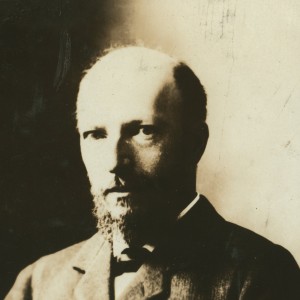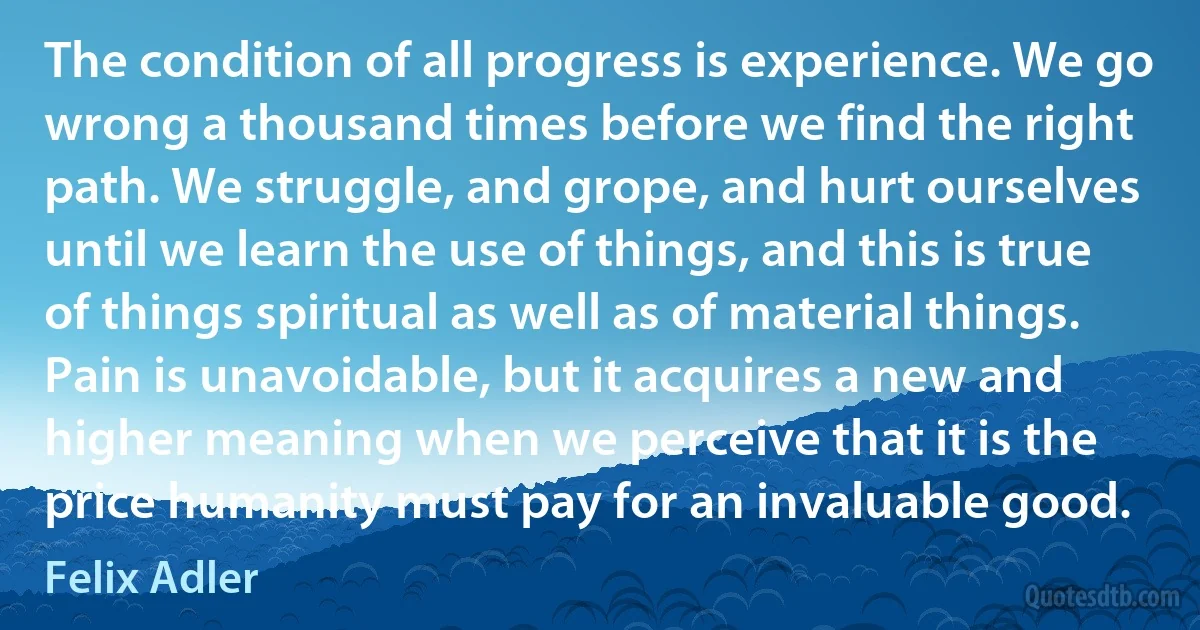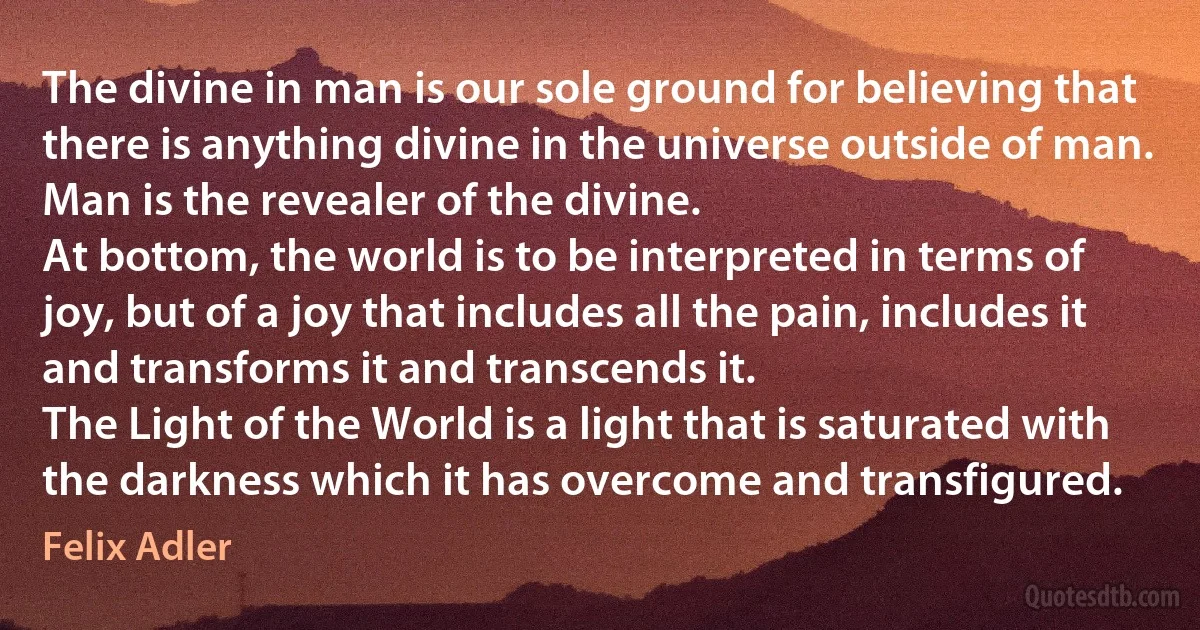Felix Adler quotes - page 3
Felix Adler was an American circus performer best known as the “King of Clowns” in the Ringling Bros. and Barnum & Bailey Circus. His unique comedic style and elaborate costumes delighted audiences for decades. He became a beloved icon in the history of American entertainment. Here are 82 of his quotes:
Already complaints are multiplying on every hand that that most gracious quality of all that adorns the age of childhood - the quality of reverence - is fast fading from our schools and households; that the oldtime respect for father and mother is diminished, and grown rarer and more uncertain.

Felix Adler
We propose to entirely exclude prayer and every form of ritual. Thus shall we avoid even the appearance of interfering with those to whom prayer and ritual, as a mode of expressing religious sentiment, are dear. And on the other hand we shall be just to those who have ceased to regard them as satisfactory and dispensed with them in their own persons.

Felix Adler
Statesmen and Philanthropists are busy suggesting remedies for the cure of these great evils. But the renovation of our Civil Service, the reform of our Primaries, and whatever other measures may be devised, they all depend in the last instance upon the fidelity of those to whom their execution must be entrusted. They will all fail unless the root of the evil be attacked, unless the conscience of men be aroused, the confusion of right and wrong checked, and the loftier purposes of our being again brought powerfully home to the hearts of the people.

Felix Adler
The peace that passeth understanding is that which comes when the pain is not relieved, which subsists in the midst of the painful situation, suffusing it, which springs out of the pain itself, which shimmers on the crest of the wave of pain, which is the spear of frustration transfigured into the shaft of light. It is upon those we love that we must anchor ourselves spiritually in the last moments. The sense of interconnectedness with them stands out vividly by way of contrast at the very moment when our mortal connection with them is about to be dissolved. And the intertwining of our life with theirs, the living in the life that is in them, is but a part of our living in the infinite manifold of the spiritual life. The thought of this, as apprehended, not in terms of knowledge, but in immediate experience, begets the peace that passeth understanding. And it is upon the bosom of that peace that we can pass safely out of the realm of time and space.

Felix Adler
Spiritual evolution is the progressive advance of mankind toward a state of things in which the light of ethical perfection shall be reflected from the face of human society; that is, in which all men shall live and move and have their being in mutually promoting the highest life of each and all. It means that the object of social reformation shall not be a mere change in the conditions under which men live, but a change in human nature itself. It means that we shall look forward consciously to the breaking forth of new powers in ourselves, to the release, through our own efforts, of capacities dimly latent in us.

Felix Adler
To those who are longing for a higher life, who deeply feel the need of religious satisfactions, we suggest that there is a way in which the demands of the head and the heart may be reconciled. Religion is not necessarily allied with dogma, a new kind of faith is possible, based not upon legend and tradition, not upon the authority of any book, but upon the moral nature of man.

Felix Adler
The question what to believe is perhaps the most momentous that anyone can put to himself. Our beliefs are not to be classed among the luxuries, but among the necessaries of existence. They become particularly important in times of trouble. They are like the life-boats carried by ocean ships. As long as the sea is smooth and there is every appearance of a prosperous voyage, the passengers seldom take note of the boats or inquire into their sea-worthiness. But when the storm breaks and danger approaches, then the capacity of the boats and their soundness become matters of the first importance.

Felix Adler
The bitter, yet merciful, lesson which death teaches us is to distinguish the gold from the tinsel, the true values from the worthless chaff.
The terrible events of life are great eye-openers. They force us to learn that which it is wholesome for us to know, but which habitually we try to ignore - namely, that really we have no claim on a long life ; that we are each of us liable to be called off at any moment, and that the main point is not how long we live, but with what meaning we fill the short allotted span - for short it is at best.

Felix Adler
Let us learn from the lips of death the lessons of life. Let us live truly while we live, live for what is true and good and lasting. And let the memory of our dead help us to do this. For they are not wholly separated from us, if we remain loyal to them. In spirit they are with us. And we may think of them as silent, invisible, but real presences in our households.

Felix Adler
The moral ideal would embrace the whole of life. In its sight nothing is petty or indifferent. It touches the veriest trifles and turns them into shining gold. We are royal by virtue of it, and like the kings in the fairy tale, we may never lay aside our crowns.
The moral order never is, but is ever becoming. It grows with our growth.

Felix Adler
Of the origin of things we know nothing, and can know nothing. Perfection does not reveal itself to us as existent in the beginning; but as something that ought to be, something new which we are to help create. Somehow the secret of the universe is hidden in our breast. Somehow the destinies of the universe depend upon our exertions.

Felix Adler
Here are two kinds of light, the light on the hither side of the darkness and the light beyond the darkness. We must press on through the darkness and the terror of it if we would reach the holier light beyond.
We are here - no matter who put us here, or how we came here - to fulfil a task. We cannot afford to go of our own volition until the last item of our duty is discharged.

Felix Adler
The fact that there is a spiritual power in us, that is to say, a power which testifies to the unity of our life with the life of others, which impels us to regard others as other selves - this fact conies home to us even more forcibly in sorrow than in joy. It is thrown into clearest relief on the background of pain.
In the glow of achievement we are apt to be full of a false self-importance. But in moments of weakness we realise, through contrast, the infinitely superior strength of the power whose very humble organs and ministers we are. It is then we come to understand that, isolated from it, we are nothing; at one with it, identified with it, we participate in its eternal nature, in its resistless course.

Felix Adler
Gladness, in some instances, springs from a natural buoyancy of temperament, and is quite consistent with shallowness and superficiality of character. In other cases it is coincident with the swift flow of the currents of the blood, and ceases when the stream flows more slowly and begins to stagnate. Or it is due to gifts which an exceptional good fortune showers into the laps of favoured mortals. Gladness of this sort comes with happiness and departs with it.
But the purified gladness of which I speak is not dependent on these accidents. It is the mark of the ripest wisdom, and is based on the conviction, gained through experience, that life is worth living, that the victory is assured, and that the ends we pursue are of such excellence as to be incapable of ultimate defeat.

Felix Adler
Man is like a tree, with the mighty trunk of intellect, the spreading branches of imagination, and the roots of the lower instincts that bind him to the earth. The moral life, however, is the fruit he bears; in it his true nature is revealed.
It is the prerogative of man that he need not blindly follow the law of his natural being, but is himself the author of a higher moral law, and creates it even in acting it out.

Felix Adler
Ethical religion affirms the continuity of progress toward moral perfection. It affirms that the spiritual development of the human race cannot be prematurely cut off, either gradually or suddenly; that every stone of offence against which we stumble is a stepping-stone to some greater good ; that, at the end of days, if we choose to put it so, or, rather, in some sphere beyond the world of space and time, all the rays of progress will be summed and centred in a transcendent focus.

Felix Adler
Good deeds remain good, no matter whether we know how the world was made or not. Vile deeds are vile, no matter whether we know or do not know what, after death, will be the fate of the doer. We know, at least, what his fate is now, namely, to be wedded to the vileness.
The question for anyone to decide, who hesitates between good and evil, is whether he aspires to be a full-weight man, or merely the fragment, nay, the counterfeit of a man. Only he who ceaselessly aims at moral completeness is, in the true sense, a human being.

Felix Adler
Felix Adler
 Occupation: German-American Professor
Occupation: German-American Professor
Born: August 13, 1851
Died: April 24, 1933
Quotes count: 82
Wikipedia: Felix Adler













